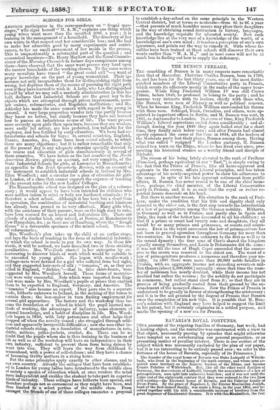THE BUNSEN PEERAGE.
Tire ennobling of Bunsen is in many respects more remarkable than that of Macaulay. Christian Charles Bunsen, born in 1790, is, and has been for the last thirty years, one of the most distin- guished members of the Liberal Conservative party in Prussia, which counts its adherents mostly in the ranks of the upper bour- geoisie. While King Frederick William IV was still Crown Prince, before 1810, he professed to belong to the party ; and he became very intimate with its leaders, chiefly with those who, like Bunsen, were men of literary as well as political renown. When he became King, Frederick William surrounded his throne with these men. Schlegel, Tieck, Cornelius and others, were ap- pointed to important offices in Berlin, and M. Bunsen was sent, in 1841, as Ambassador to London. In course of time, King Frederick William's Liberal aspirations cooled down considerably ; and al- though during the year 1848 they again boiled over for a short time, they finally said, below zero ; and after Prussia had almost openly espoused the cause of the Czar in 1851, all the leaders of the Moderate party lost their places, Bunsen among them. Having what was called resigned " the London embassy, M. Bunsen retired to a town on the Rhine, where he has lived ever since, pro- scouting his historical studies as a worthy friend and disciple of Niebuhr.
The reason of his being lately elevated to the rank of Freiherr (Free-lord, perhaps equivalent to our " Earl,") is simply owing to the fact that the Prince of Prussia, like all heirs-apparent and aspirants to the crown, affects Liberal principles, and has taken advantage of his newly-acquired power to show his adherence to the cause. In spite of his late apparent retirement from public affairs, M. Bunsen has never ceased to be one of the chief mem- bers perhaps the chief member, of the Liberal Conservative partyin Prussia, and it is as such that the royal or rather re- gential favour descends on his head. But there is another reason. His elevation to the rank of Frei- herr, under the condition that his title and dignity shall only descend to the eldest son, is the first step towards the introduction of a law of primogeniture among the German nobility. Hitherto, in Germany as well as in France, and partly also in Spain and Italy, the rank of the father has descended to all his children ; so that if a prince or count had twenty sons and daughters, they all would be so many princes and princesses, or counts and count- esses. Even in the royal succession the law of primogeniture has not been in general operation throughout Germany for more than two centuries. In France it was unknown to the first as well as to the second dynasty ; the four sons of Clovis shared the kingdom equally among themselves' and Louis le Debonnaire did the same: it was not till the race of Hugh Capet succeeded that the succes- sion to the crown was reserved to the eldest son. The want of a law of primogeniture produces a numerous and therefore poor no- bility: In 1805 there were more than 20,000 noble families in Prussia, with an aggregate income not exceeding seventeen mil- lion thalers (about 2,500,0000 annually: since that time the num- ber of noblemen has nearly doubled, while their income has not doubled but rather the reverse ; for the nobility do not participate in commerce but rather stand aloof from it; so that they are in process of being gradually ousted from their ground by the en- croachment of the moneyed classes. Now the Prince of Prussia is understood to be greatly in favour of strengthening the aristocracy; and it is to the aid granted by the Regent of Prussia that Bunsen owes the completion of his new title. It is possible that M. Bun- sen's relation with England may have helped to suggest the limit in his patent, but it certainly originates in a settled purpose, and marks the opening of a new era for Prussia.


































 Previous page
Previous page